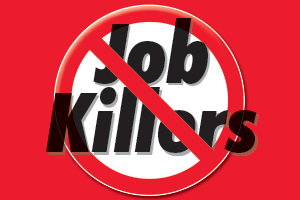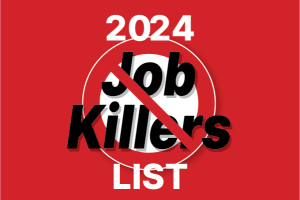
2023 Job Killer List
Related News – 2023 Job Killers
The California Chamber of Commerce has named the following as job killer bills for 2023.
Labor and Employment
AB 524 (Wicks; D-Oakland) Expansion of Litigation Under FEHA. Exposes employers to costly litigation under the Fair Employment and Housing Act by asserting that any adverse employment action was in relation to the employee’s family caregiver status, which is broadly defined to include any employee who provides direct care of any person of their choosing, and creates a de facto accommodation requirement that will burden small businesses. Vetoed.
AB 647 (Holden; D-Pasadena) Grocery Workers. Significantly expands statute related to successor grocery employers, including disrupting the ability for independent small stores to join together and creating a significant new private right of action. Signed. Chapter 452, Statutes of 2023.
AB 1156 (Bonta; D-Alameda) Expands Costly Presumption of Injury. Significantly increases workers’ compensation costs for public and private hospitals by presuming certain diseases and injuries are caused by the workplace and establishes an extremely concerning precedent for expanding presumptions into the private sector. In Assembly Insurance Committee. Failed deadline to move from policy committee to fiscal committee, April 28, 2023.
SB 365 (Wiener: D-San Francisco) Undermines Arbitration. Discriminates against use of arbitration agreements by allowing trial courts to continue trial proceedings during any appeal regarding the denial of a motion to compel. Signed. Chapter 710, Statutes of 2023.
SB 399 (Wahab; D-Hayward) Bans Employer Speech. Chills employer speech regarding religious and political matters, including unionization. Is likely unconstitutional under the First Amendment and preempted by the National Labor Relations Act. Failed deadline to move from fiscal committee to floor, September 1, 2023.
SB 525 (Durazo; D-Los Angeles) Costly Minimum Wage Increase. Imposes significant cost on health care facilities and any employer who works with health care facilities by mandating increase in minimum wage to $25. Job killer tag and opposition removed due to September 11, 2023 amendments, which phased in certain minimum wage increases based on hospital size and operations. Signed. Chapter 890, Statutes of 2023.
SB 616 (Gonzalez; D-Long Beach) Costly Sick Leave Expansion on All Employers. Imposes new costs and leave requirements on employers of all sizes, by nearly doubling existing sick leave mandate, which is in addition to all other enacted leave mandates that small employers throughout the state are already struggling with to implement and comply. Signed. Chapter 309, Statutes of 2023.
SB 627 (Smallwood-Cuevas; D-Los Angeles) Onerous Return to Work Mandate. Imposes an onerous and stringent process to hire employees based on seniority alone for nearly every industry, including hospitals, retail, restaurants and movie theaters, which will delay hiring and eliminates contracts for at-will employment. Vetoed.
SB 723 (Durazo; D-Los Angeles) Onerous Return to Work Mandate. Unnecessarily extends sunset on COVID-19 specific law that created an onerous and stringent process for specific employers to return employees to the workforce for specified industries, including hotels and restaurants that have been disproportionally impacted by this pandemic. Job killer status removed due to September 7, 2023, amendments. Signed. Chapter 719, Statutes of 2023.
SB 799 (Portantino; D-Burbank) Increased Unemployment Insurance Taxes to Subsidize Striking Workers. SB 799 will allow striking workers to claim UI benefits when they choose to strike. Because the UI Fund is paid for entirely by employers, SB 799 will effectively add more debt onto California employers. Moreover, SB 799 will effectively force employers to subsidize strikes at completely unrelated businesses because the UI Fund’s debt adds taxes for all employers, regardless of whether they’ve had a strike. Vetoed.
SB 809 (Smallwood-Cuevas; D-Los Angeles) Prohibits Consideration of Conviction History in Employment. Prohibits nearly every employer from considering conviction history of an applicant or existing employee in employment decisions and imposes cumbersome process on employers that are legally not allowed to hire individuals with certain convictions. Held in Senate Appropriations Committee, May 18, 2023.
Taxation
AB 259 (Lee; D-San Jose) / ACA 3 (Lee; D-San Jose) Wealth Tax. Seeks to impose a massive tax increase upon all forms of personal property or wealth, whether tangible or intangible, despite California already having the highest income tax in the country. This tax increase will drive high-income earners out of the State as well as the revenue they contribute to the General Fund. In Assembly Revenue and Taxation Committee, March 30, 2023.
SB 220 (Senate Budget and Fiscal Review Committee) Corporate Tax Hike. Increases the corporate tax rate to 10.99% for many California employers which will drive them out of the state and decrease the revenue they contribute to the General Fund. In Senate Budget and Fiscal Review Committee, May 25, 2023.
Housing
AB 68 (Ward; D-San Diego) Quashes Housing. Worsens California’s existing housing crisis by preventing local governments from permitting new housing units in most of their jurisdictions. In Assembly Housing and Community Development Committee. Failed deadline to move from policy committee to fiscal committee, April 28, 2023.
Environmental
AB 1000 (Reyes; D-San Bernardino) De Facto Ban of Warehouses. Mandates a statewide setback of 1,000 feet from sensitive receptors for all new or expanded logistics use facilities, regardless of environmental impacts, establishing a de facto ban. Also creates a new private right of action in California. Failed passage in Assembly Local Government Committee, April 26, 2023. Reconsideration granted.
Climate/Energy
AB 9 (Muratsuchi; D-Torrance) Greenhouse Gases. Imposes additional evaluation criteria on California’s cap-and-trade program that will lead to market instability and increased costs for consumers. Job killer status removed due to April 17, 2023 amendments, but CalChamber remains opposed. Assembly Inactive File, June 1, 2023.
SB 12 (Stern; D-Canoga Park) Arbitrary Greenhouse Gas Target. Arbitrarily changes the State’s GHG reduction goal from 40% of 1990 levels by 2030 to 55%. By the State’s own estimate this proposal will force 17 million gas-powered cars off the road in the next 10 years. Held in Senate Appropriations Committee, May 18, 2023.
SBX1 2 (Skinner; D-Berkeley) Windfall Profits Tax. Sets an arbitrary cap on the amount of profit that a refiner operating in the state of California can earn over a quarterly basis. This measure would further diminish supply, discourages operational efficiencies, and would limit the amount of capital a refiner could reinvest into their infrastructure to support California’s long-term climate goals. Signed. Chapter 1, Statutes of 2023–24 First Extraordinary Session.
Cumulative Job Killer Vetoes
- 2023: 19 Job Killers identified, 7 sent to Governor Gavin Newsom, 4 signed, 3 vetoed.
- 2022: 19 Job Killers identified, 2 sent to Governor Newsom, 2 signed.
- 2021: 25 Job Killers identified, 2 sent to Governor Newsom, 1 signed, 1 vetoed.
- 2020: 19 Job Killers identified, 2 sent to Governor Newsom, 1 signed, 1 vetoed.
- 2019: 31 Job Killers identified, 2 sent to Governor Newsom, 1 signed, 1 vetoed.
- 2018: 29 Job Killers identified, 1 sent to Governor Edmund G. Brown Jr., 1 vetoed.
- 2017: 27 Job Killers identified, 3 sent to Governor Brown, 2 signed, 1 vetoed.
- 2016: 24 Job Killers identified, 5 sent to Governor Brown, 4 signed, 1 vetoed.
- 2015: 19 Job Killer bills identified, 3 sent to Governor Brown, 1 signed, 2 vetoed.
- 2014: 27 Job Killer bills identified, 2 sent to Governor Brown, 2 signed.
- 2013: 38 Job Killer bills identified, 1 sent to Governor Brown, 1 signed.
- 2012: 32 Job Killer bills identified, 6 sent to Governor Brown, 4 signed, 2 vetoed.
- 2011: 30 Job Killer bills identified, 5 sent to Governor Brown, 1 signed, 4 vetoed.
- 2010: 43 Job Killer bills identified, 12 sent to Governor Arnold Schwarzenegger, 2 signed, 10 vetoed.
- 2009: 33 Job Killer bills identified, 6 sent to Governor Schwarzenegger, 6 vetoed.
- 2008: 39 Job Killer bills identified, 10 sent to Governor Schwarzenegger, 1 signed, 9 vetoed.
- 2007: 30 Job Killer bills identified, 12 sent to Governor Schwarzenegger, 12 vetoed.
- 2006: 40 Job Killer bills identified, 11 sent to Governor Schwarzenegger, 2 signed, 9 vetoed.
- 2005: 45 Job Killer bills identified, 8 sent to Governor Schwarzenegger, 1 signed, 7 vetoed.
- 2004: 23 Job Killer bills identified, 10 sent to Governor Schwarzenegger, 10 vetoed.
- 2003: 53 Job Killer bills identified, 13 sent to Governor Gray Davis, 11 signed, 2 vetoed.
- 2002: 35 Job Killer bills identified, 17 sent to Governor Davis, 12 signed, 5 vetoed.
- 2001: 12 Job Killer bills identified, 5 sent to Governor Davis, 3 signed, 2 vetoed.
- 2000: No Job Killers identified. Of 4 bad bills identified at end of session, Governor Davis signs 2 and vetoes 2.
- 1999: 30 Job Killer bills identified, 9 sent to Governor Davis, 6 signed, 3 vetoed.
- 1998: 64 Job Killer bills identified, 11 sent to Governor Pete Wilson, 11 vetoed.
- 1997: 57 Job Killer bills identified, 9 sent to Governor Wilson, 9 vetoed.




